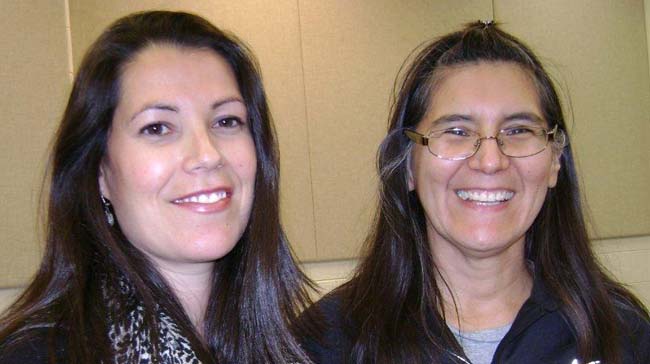Film portrays knowledge transfer

By Barb Nahwegahbow
TORONTO –Anishinaabe scholar Chantelle A.M. Richmond was frustrated with research done in First Nations communities that benefitted the researchers more than it did the communities, so she decided to do something about it.
The result is a 60-minute documentary titled “Gifts from the Elders”, the product of a summer-long community-based research project that paired youth and elders to transfer traditional knowledge. Two communities were involved – Ojibways of Pic River First Nation, Richmond’s home community, and Batchewana First Nation of Ojibways.
Richmond says this approach involves community members throughout the process and makes it more likely that researchers will respond to their concerns.
“My heart has always been in the community,” said Richmond. Her uncle Roy Michano, who has served 16 yerms as Chief of Pic River, is one of her role models.
“He’s fought really hard for land rights, environmental issues,” she said, adding that Chief Michano sset an example for her “to follow what I felt passionate about.”
Associate Professor in the Department of Geography with a cross-appointment in First Nations Studies and the Department of Family Medicine at Western University in London, Ontario, Richmond describes herself as “a First Nation scholar who has trained primarily in health geography.”
She is deeply concerned about the health and social issues faced by Indigenous peoples in Canada because of colonization and the resulting dispossession of the land. Environmental degradation caused by development has destroyed hunting and trapping grounds and forests where medicines were harvested. Poisons have been dumped into lakes and rivers that once provided fish and sustenance for families.
All of this has left the health of First Nations people severely compromised in all ways – physically, emotionally, spiritually and mentally – and both youth and elders in the film voice their concerns about health issues such as addictions, nutrition, obesity and lack of spiritual involvement that they see in their communities.
The loss of the harmonious relationship with the land also caused a breach in the relationship between people. The relationship to which Richmond directed her attention in the research project was the one between youth and elders. In the days before colonization and development, elders and youth spent time on the land. In this way, young people learned that harmony with the land and respect for the environment, a fundamental Indigenous value, was crucial to the continuing survival of the Anishinaabe people.
“The most important lesson learned from the project,” said Richmond, “was the great potential for knowledge transfer between elders and youth, and what an untapped potential there is in sustaining those relationships…”
While the young people were intimidated at first about the prospect of talking with the elders, their excitement at learning helped them overcome their initial fear. The film shows the changes in the young people, but it also shows the pride restored in the elders because of the affirmation that they have something valuable to share.
The two communities have each been given 500 copies of “Gifts from the Elders” to share as they wish. “What we’re really excited about,” said Richmond, “is that Indigenous communities in faraway places can see their own issues reflected here [in the film], and be inspired to say, ‘we should do something like this’. It may not be a film but it may be a project that gets youth and elders together hanging out on the land or just talking. In spite of the fact that Indigenous communities are so far apart, so many of the environmental struggles we face are so similar.”
While illustrating how much has been lost by Anishinaabe due to colonization, the film is optimistic in showing that young people are waking up to the need to restore harmony with the natural world and that there are loving elders who have picked up their bundles of traditional knowledge and are there to help them.
“Gifts from the Elders” screened at the University of Toronto on Nov. 1st when Richmond was introduced by another Anishinaabe scholar, Dr. Deb McGregor from Whitefish River First Nation, Professor of Geography and Aboriginal Studies.
It has been selected for screening at two U.S. film festivals, the American Indian Film Festival and the L.A. Skins Film Festival. Starting in January 2014, “Gifts from the Elders” will be available online at www.giftsfromtheelders.ca. In the meantime, Richmond may be contacted directly for a copy. Richmond is the producer/writer while James Fortier, also a member of Pic River, is the Director.


